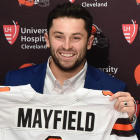If the rookie wage scale had never been implemented, Baker Mayfield, as the first-overall pick in the 2018 NFL Draft, probably could have expected a six-year contract with a base value of $130 million (where $85 million or more was fully guaranteed) from the Browns, given how rookie contracts at the top of the draft were escalating. The maximum value for Mayfield's six years could have been as much as $145 million.
Of course, that's not Mayfield's actual contract. The 2011 Collective Bargaining Agreement overhauled the NFL's system of rookie compensation. The rookie wage scale implemented after the 2011 lockout drastically reduced salaries for players taken at top of the NFL draft. It ended the practice of routinely paying unproven commodities like Pro-Bowl caliber players.
As 2011's top pick, Cam Newton signed a fully guaranteed four-year, $22,025,498 deal, which included a $14,518,544 signing bonus. He was probably going to sign a six-year deal that had a base value in the $86 million neighborhood with a maximum of approximately $95 million in which $55 million would have been guaranteed if the system hadn't changed.
Looking for a hot new NFL podcast that's your home for NFL coverage? Look no further. The Pick 6 Podcast with Will Brinson has you covered each day with new episodes around 30 minutes each. Subscribe: via iTunes | via Stitcher | via TuneIn | via Google Play.
Here's a look at the deals a select group of 2018 first-round picks are expected to sign. A discussion follows highlighting how the rookie wage scale operates, as well as important considerations relating to the first-round contracts.
| Pick | Name | Team | '18 cap number | Signing bonus | Four-year total |
|---|---|---|---|---|---|
1 | Baker Mayfield | Browns | $5,942,360 | $21,849,440 | $32,682,980 |
2 | $5,671, 773 | $20,767,092 | $31,194,752 | ||
3 | $5,499,581 | $20,078,324 | $30,247,696 | ||
4 | Browns | $5,302,792 | $19,291,168 | $29,165,356 | |
5 | $4,958,407 | $17,913,628 | $27,271,239 | ||
6 | $4,343,438 | $15,453,752 | $23,888,909 | ||
7 | $3,851,461 | $13,485,844 | $21,183,036 | ||
8 | $3,359,485 | $11,517,940 | $18,477,168 | ||
9 | 49ers | $3,334,886 | $11,419,544 | $18,341,873 | |
10 | $3,199,593 | $10,878,372 | $17,597,762 | ||
15 | $2,449,329 | $7,877,316 | $13,471,310 | ||
17 | $2,252,537 | $7,090,148 | $12,388,954 | ||
20 | $2,141,843 | $6,647,372 | $11,780,137 | ||
24 | D.J. Moore | $2,031,148 | $6,204,592 | $11,171,314 | |
27 | $1,957,352 | $5,909,408 | $10,765,436 | ||
32 | $1,722,118 | $4,968,472 | $9,471,649 |
How the rookie wage scale operates
The rookie wage scale is essentially a salary cap within the overall salary cap. The increases in rookie salaries from one draft class to another are tied to growth of the salary cap. The 6.11 percent increase in the salary cap from 2017 has resulted in signing bonuses for each pick this year going up by approximately 7.8 percent.
There's a league-wide limit on the total amount of compensation for rookies with specific salary parameters for each draft slot. Teams have maximum and minimum amounts that can be spent on their picks based on draft position.
All contracts for draft choices are four years. Each pick in the draft has a salary floor and ceiling in the first year and over the four years of the contract. There are very few negotiable items with rookie contracts anymore. The salary components of a deal are restricted to signing bonus, base salary, roster bonus, reporting bonus, workout bonus and select incentives. The type of salary escalators and incentives that were responsible for salaries skyrocketing at the top of draft are prohibited under the rookie wage scale. A majority of picks have only signing bonus and base salaries in their deals.
First-year salary-cap number
An extremely important aspect of these deals is the first-year salary cap number (also known as the rookie pool number) because it helps determine the overall value of contract. That number consists of the player's prorated amount of signing bonus and the rookie minimum base salary, which is $480,000 in 2018.
The maximum annual increase in each of the four years of a deal is 25 percent of the first-year cap number. For example, 2017 sixth-overall pick Jamal Adams' cap numbers were limited to a $1,011,764 increase in each year of his deal because his first-year cap in 2017 was $4,047,056. Since all of these deals have minimum base salaries in the first year, the remainder of the contract is derived within these constraints.
Draft-pick contracts can't be renegotiated until the conclusion of a player's third NFL regular season. This means the earliest Adams' deal can be redone is late December 2019 or early January 2020.
Fifth-year option
With first-round picks, teams have an option for a fifth year that must be exercised after the third year of the deal. The period for exercising fifth-year options begins when a player's third NFL regular season ends (Jan. 1, 2018 with the 2015 first round picks). These options must be picked up prior to May 3. The window for 2015 first-round picks is almost over.
The fifth year is guaranteed for injury when the option is exercised. The option year becomes fully guaranteed on the first day of the league year in the fifth contract year (early to mid March 2019 for the 2015 first-round draft picks).
The fifth-year salary for the top 10 picks is the transition tender, which is average of the 10 highest salaries, for a player's position in the fourth year of his contract. The Buccaneers picked up the option for 2015 first-overall pick Jameis Winston. His option-year salary in 2019 is $20.922 million. The fifth-year salary for players selected outside of the top 10 (picks 11-32) is the average of the third- through 25th-highest salaries at a player's position.
Third- through seventh-round picks have a base-salary escalator for their fourth year based on participating in a minimum of 35% of the offensive or defensive plays, whichever is applicable, in two of the first three seasons of their deals or an average of at least 35% playtime in their first three seasons. The salary equals the lowest restricted free agent tender in the fourth year. The 2018 salary for 2015 third through seventh round picks that earned the escalator is $1.907 million.
Negotiable items
The two primary negotiating issues, particularly at the top of the draft, are the payment schedule of the signing bonus and whether salary guarantees will have offsets.
Deals are now signed at a much quicker pace than they were prior to the rookie wage scale since contract values and signing bonuses are predetermined. The Panthers and Falcons signed their entire 2017 draft classes before rookie minicamps -- which can be held during the first two weekends after the draft -- started last year. Only 17 of 2017's 253 draft picks were still unsigned when offseason workouts ended in the middle of last June. Every 2017 draftee reported to training camp on time.
Before the rookie compensation system was overhauled, a majority of rookies didn't sign contracts until the latter part of July, as training camp approached. In 2010, no player selected in the first two rounds had signed by the Fourth of July. It wasn't unusual for first-round picks to hold out, either. For example, 2007 first-overall pick JaMarcus Russell held out for 47 days before signing with the Raiders. Rookie holdouts are largely a thing of the past.
The Chargers' third-overall pick Joey Bosa engaged in the longest contract dispute for an incoming NFL player in 2016 since the rookie wage scale was implemented. Bosa was the first rookie since 2013 that didn't show up to training camp on time. He missed 31 days before signing his contract.
The Chargers and Bosa weren't disagreeing over the amount of money in his contract because the total value was dictated by the rookie wage scale's constraints. The dispute was largely over whether the deal should contain offsets and the payment schedule of his signing bonus. The concession the Chargers made to Bosa was a better payment schedule than they typically give to players with big signing bonuses.
Signing bonuses and offset clauses
Large signing bonuses in NFL contracts are typically paid in installments rather than the player receiving the entire amount upon execution of the agreement. This is a long-accepted practice in the NFL. Signing bonuses for top draft picks are usually paid in two to four installments. For example, 2017 first-overall pick Myles Garrett received $12.25 million of his $20,258,004 signing bonus from the Browns within 30 days of signing his contract. The remaining $8,008,004 was paid Jan. 5.
Payment of the entire signing bonus before the end of a player's rookie season can depend on whether his contract contains offsets. A team generally receives a more favorable signing bonus payment schedule with a significant amount deferred until early in the next calendar year when there aren't any offsets.
An offset clause allows a team to reduce the guaranteed money owed to a player when he is released by the amount of his new deal with another team. The player receives his salary from the team that released him in addition to the full salary from his new contract with another club when there isn't an offset (also known as "double dipping").
Agents have essentially lost the battle on offsets. Teams with early first-round picks in 2013 were adamant that contracts contain offsets after largely conceding the issue the previous year. Nearly every team besides the Jaguars and the Rams, who didn't have a first-round pick this year, require offsets with salary guarantees for draft picks. As a compromise, most teams structure deals containing minimum base salaries in the final three years with the remainder of a player's salary in annual fully guaranteed third- or fifth-day-of-training-camp roster bonuses for top 10 picks.
A quarterback has the best chance of extracting a concession on offsets compared to players at other positions. Mitchell Trubisky, the second-overall pick in 2017, signed a deal with the Bears where his $465,000 2017 base salary and training-camp roster bonuses in 2018 through 2020, which contain most of the money in the last three years of his contract, don't have offsets. All of the other Bears first-round picks signed under the rookie wage scale, including 2015 seventh-overall pick Kevin White and 2016 ninth-overall pick Leonard Floyd, have offsets. Expect the Bears to insist that 2018 eighth-overall pick Roquan Smith signs a contract like White's and Floyd's instead of Trubisky's.
It will be interesting to see whether Jacksonville signs 29th-overall pick Taven Bryan to a contract where his salary guarantees have offsets. The Jaguars haven't required offsets for their last six first-round picks, which have all been in the top five of the draft.
The entire contracts of the first 21 picks of the first round were fully guaranteed in 2016 and 2017. The deals for the final 11 picks of the first round were guaranteed for the first three years. A decreasing portion of their fourth-year base salary has been guaranteed as the picks progress. Charles Harris, the No. 22 overall pick in 2017, has 85 percent of his fourth-year salary in 2020 fully guaranteed while 13 percent of 2017 32nd overall pick Ryan Ramczyk's is fully guaranteed.















